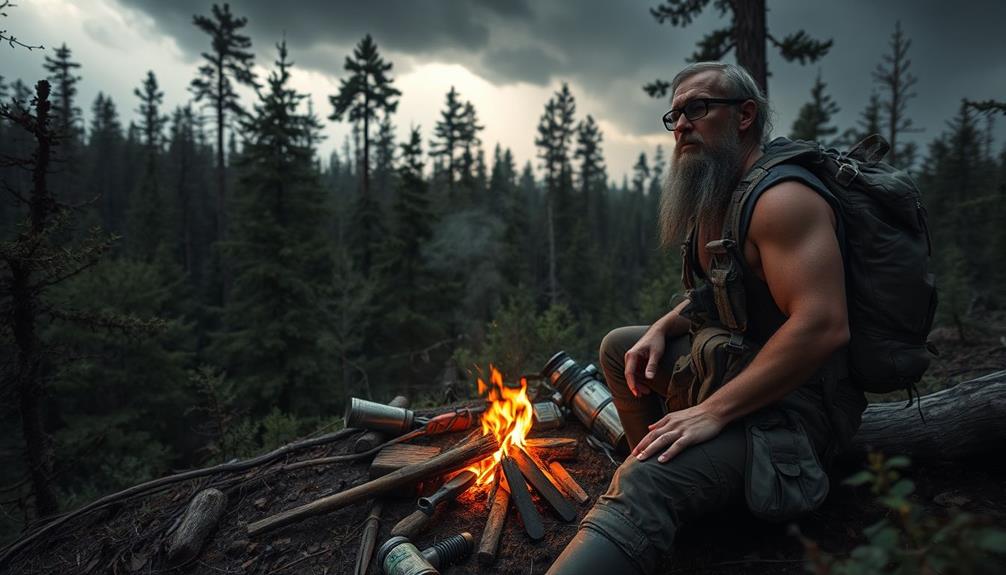Preppers are folks who focus on readiness, resilience, and self-sufficiency, living a lifestyle centered on preparedness for uncertainties. They prioritize mental well-being, adaptability, and preparedness. Stockpiling essentials like food and water is common, fostering a daily mindset of readiness. Being prepared brings self-reliance, protection for loved ones, and a sense of security. Preppers stress proactive measures over panic, honing skills for emergencies. Their community networking and evolving strategies aim for collaboration and problem-solving. The prepper mindset values resilience and empowerment, advocating for readiness in all aspects of life.
Key Takeaways
- Preppers value self-reliance, preparedness, and resilience.
- They prioritize mental preparedness and critical thinking.
- Preppers focus on strategic planning for emergencies.
- Embrace a lifestyle of readiness, adaptability, and independence.
- Cultivate skills, knowledge, and proactive preparedness.
The Prepper Mindset
To truly understand the prepper mindset, you must embrace a mentality centered on resilience, empowerment, and safety. Preppers stock up on essential items like canned goods to prepare for potential disasters such as power outages. By having a supply of non-perishable food items, preppers guarantee they can sustain themselves during emergencies when access to fresh food is limited.
This proactive approach not only provides physical security but also contributes to mental well-being. Knowing you have the necessary supplies to weather a storm can alleviate stress and anxiety, promoting better mental health during challenging times.
In the face of uncertainty, preppers prioritize mental health by staying calm under pressure and practicing gratitude. By cultivating adaptability and mental resilience, preppers equip themselves to face various challenges effectively. This focus on preparedness not only enhances safety but also fosters a sense of empowerment, enabling individuals to navigate difficult situations with confidence.
Core Values of Prepping

Prepping is all about prioritizing preparedness and adopting a self-reliant mindset.
Core values include responsibility, adaptability, and mental resilience in tough situations.
Preparedness as Priority
Emphasizing preparedness as a core value, preppers prioritize readiness for emergencies above all else. For preppers, being prepared isn't just a hobby; it's a way of life. They believe in taking proactive steps to guarantee their safety and that of their loved ones in any situation.
Preparedness is like an insurance policy for life, focusing on resilience, adaptability, and mental strength. Preppers value responsibility, planning, and the ability to stay calm under pressure as essential qualities for facing challenges effectively.
Cultivating skills, knowledge, and a proactive approach to preparedness are fundamental aspects of the prepper lifestyle. By making preparedness a priority, preppers empower themselves to navigate unexpected events with confidence and security. Being ready for emergencies allows preppers to face uncertainties head-on and provide a sense of control in an unpredictable world.
Self-Reliance Mindset
Value self-reliance, independence, and personal responsibility for your safety as core principles of prepping. Embracing a self-reliance mindset is fundamental for preppers. It involves being prepared to take care of yourself and your loved ones in any situation.
This mindset encourages you to learn essential skills like first aid, shelter-building, and food preservation. By having a plan in place and being resourceful during emergencies, preppers can navigate challenging circumstances with confidence. The self-reliance mindset also emphasizes mental resilience, critical thinking, and the ability to stay calm under pressure.
It cultivates a sense of empowerment, control, and readiness for whatever may come your way. Preppers believe in being proactive and adaptable, always aiming to be self-sufficient and capable of handling unexpected events. By embodying the values of self-reliance and personal responsibility, preppers equip themselves to face uncertainties with resilience and determination.
Prepping as a Lifestyle

When prepping becomes a lifestyle, you prioritize essentials at home, maintain a preparedness mindset every day, and make lifestyle choices that align with prepping principles.
By ensuring you have necessary supplies, honing your skills, and keeping a readiness mindset, you embody the prepping lifestyle.
Your choices reflect a focus on security, sustainability, and independence, emphasizing proactive measures for your safety and future readiness.
Prepping Essentials At-Home
Stockpile non-perishable food, water, and essential supplies at home for emergency preparedness as a fundamental aspect of prepping as a lifestyle. Preppers prioritize having these essentials readily available to make sure they can sustain themselves during unexpected situations.
Along with food and water, consider securing your shelter to make it safe and resilient in the face of disasters. Opt for calorie-dense, long-lasting food options and explore alternative water sources to enhance your preparedness.
Essential tools like knives, flashlights, radios, and first aid kits are vital for handling challenges effectively at home. Additionally, advanced preparations may involve ensuring energy security, planning for home defense, undergoing self-defense training, and having communication tools in place for heightened readiness.
Preparedness Mindset Everyday
To fully embrace prepping as a lifestyle, you must cultivate a mindset of preparedness in your everyday actions and decisions. Prepping isn't just about storing supplies; it's a way of thinking and living that prepares you for whatever may come your way.
Here are three key aspects to ponder:
- Proactivity: Being proactive means anticipating potential challenges and taking steps to address them before they happen. This mindset allows you to stay ahead of emergencies and react efficiently when needed.
- Resourcefulness: Preppers value resourcefulness by making the most of what they've available. This includes repurposing items, learning new skills, and finding creative solutions to problems.
- Readiness: Being ready involves both mental preparedness and practical readiness. Preppers prioritize staying informed, practicing drills, and ensuring they've the necessary tools and supplies readily accessible for any situation.
Lifestyle Choices for Preppers
Embracing prepping as a lifestyle involves integrating preparedness into your daily habits and choices, ensuring readiness for any potential emergency.
Preppers make conscious decisions to incorporate preparedness into their routines by conducting regular inventory checks, developing essential skills, and undergoing training to enhance self-reliance. Prioritizing self-sufficiency, resilience, and adaptability are key aspects of the lifestyle choices for preppers, aiming for long-term readiness.
Sustainable living practices, resource conservation, and community building play significant roles in preppers' daily lives, fostering collective resilience. Additionally, preppers focus on integrating mental preparedness, physical fitness, and emotional well-being into their lifestyle to effectively cope with uncertainties.
Benefits of Being Prepared

Being prepared brings a sense of security and peace of mind during emergencies, reducing stress and uncertainty. Here are three key benefits of being prepared:
- Self-Reliance and Resilience: Being prepared fosters a mindset of self-reliance, empowering you to face challenges head-on. Instead of feeling helpless during emergencies, you can take proactive steps to guarantee your safety and well-being.
- Protection for Families and Communities: Disaster preparedness not only benefits individuals but also extends to families and communities. By being prepared, you contribute to creating a safer environment for those around you, fostering a sense of security and unity.
- Practical Lifesaving Supplies: Having essential supplies like canned goods and candles can be lifesaving during power outages or other emergencies. By stockpiling necessary items in advance, you secure that you have the resources needed to navigate unexpected situations effectively.
Preparation Vs. Panic

Preppers prioritize preparedness over succumbing to panic, emphasizing proactive measures to guarantee safety and security. Their approach revolves around planning ahead, accumulating necessary supplies, and honing essential skills to effectively navigate emergencies.
Rather than giving in to fear and uncertainty, preppers advocate for self-reliance, resilience, and taking charge of their own well-being in times of crisis. By adopting a methodical and foresighted mindset, preppers steer clear of impulsive reactions and instead focus on strategic responses to potential threats.
This lifestyle highlights the significance of readiness, adaptability, and a strong sense of empowerment when confronted with adversities. Preppers believe that preparation is key to facing challenges head-on and emerging stronger on the other side.
Through their dedication to readiness and proactive measures, preppers aim to instill a sense of confidence and security in the face of uncertainties.
Facing Uncertainties Head-On

To confront uncertainties head-on, individuals who prioritize preparedness focus on planning, mitigating risks, and building resilience in the face of potential disasters. Here's how preppers tackle uncertainties:
- Planning Ahead:
Preppers anticipate various disaster scenarios and create detailed plans to address each situation effectively. This proactive approach allows them to act swiftly and decisively when faced with emergencies.
- Risk Mitigation:
Preppers actively work to reduce risks by securing supplies, fortifying shelters, and acquiring necessary skills. By identifying potential threats and taking steps to minimize their impact, preppers enhance their ability to navigate challenging circumstances.
- Building Resilience:
Preppers prioritize self-reliance, adaptability, and mental strength. By fostering these qualities through training, preparation, and a resilient mindset, individuals can better withstand adversities and emerge stronger from crises.
Evolving Prepper Strategies

In the ever-changing landscape of preparedness, prepper strategies evolve to adapt to emerging challenges and threats. Preppers continuously refine their plans, skills, and resources to stay ahead of potential disasters. This evolution involves embracing a dynamic approach that incorporates lessons learned from past emergencies. Strategies may include incorporating technology, community networking, and innovative solutions for preparedness. Flexibility, creativity, and a forward-thinking mindset are key elements in the development of evolving prepper strategies.
To illustrate the diverse strategies that preppers employ, here is a table showcasing some common approaches:
| Prepper Strategy | Description |
|---|---|
| Technology Integration | Using tools like GPS, communication devices, and apps for better disaster response |
| Community Networking | Establishing relationships with like-minded individuals for mutual support |
| Skill Building | Learning new skills such as first aid, gardening, or self-defense for self-reliance |
| Resource Diversification | Stockpiling various supplies like food, water, medicine, and tools for emergencies |
| Scenario Planning | Creating detailed plans for different disaster scenarios to enhance readiness |
Community in Prepping

Understanding the importance of community in prepping can greatly enhance your preparedness efforts and overall resilience. Preppers often come together to form close-knit groups that share knowledge, resources, and support during disasters.
Here are three key benefits of community involvement in prepping:
- Collaboration: Working together within a prepper community fosters collaboration, allowing members to pool resources, skills, and ideas for more effective preparedness strategies.
- Resilience: Building relationships with other preppers enhances collective resilience, as the group can provide support, guidance, and assistance in times of crisis.
- Problem-Solving: Prepper groups frequently organize drills, training sessions, and networking events to improve preparedness. These activities promote collective problem-solving skills, ensuring that the community is better equipped to handle emergencies.
The Psychology of Preppers

Delving into the psychology of preppers reveals a mindset rooted in self-reliance, preparedness, and resilience when facing potential disasters. Preppers exhibit a proactive approach to ensuring safety, security, and survival during emergencies. They prioritize mental preparedness, adaptability, and critical thinking skills to navigate challenging situations effectively.
Understanding potential threats, evaluating risks, and planning for various scenarios are fundamental aspects of the prepper mindset. By embracing a sense of empowerment, control, and responsibility for their well-being and that of their loved ones, preppers cultivate a mindset geared towards readiness. This mindset enables preppers to face uncertainties with a level-headed approach, emphasizing the importance of being prepared for any eventuality.
Through strategic planning and a focus on building resilience, preppers aim to mitigate risks and enhance their ability to cope with unforeseen circumstances. The psychology of preppers underscores the significance of being proactive, resourceful, and self-sufficient in the face of potential challenges.
Frequently Asked Questions
What Is the Psychology Behind Preppers?
You know, the psychology behind preppers is like a sturdy oak tree; rooted in self-reliance, control, and responsibility. Prepping empowers you to face uncertainties head-on, fostering adaptability, resilience, and a deep sense of security.
What Is the Difference Between a Prepper and a Survivalist?
Simply put, the key difference between a prepper and a survivalist boils down to their focus: preppers prioritize long-term preparedness for various disasters, while survivalists emphasize immediate survival skills in the wild.
What Is the Doomsday Prepper Culture?
In the doomsday prepper culture, you immerse yourself in a sea of readiness, like a sailor steering through stormy waters. It's about preparing for worst-case scenarios, stocking up supplies, and mastering survival skills for extreme situations.
What Is Needed to Be a Prepper?
To be a prepper, you need to stock up on non-perishable food, water, and essential supplies. Having tools like a sturdy knife, multi-tool, flashlight, hand crank radio, and first aid kit is essential. Consider energy security with solar panels or generators.
What Is the Slang Word for Survivalist?
You're wondering, 'What's the slang for survivalist?' It's 'prepper.' You might think it sounds casual, but it's all about being prepared for emergencies. Stock up on essentials, stay ready, and be resilient.
What Is the Mindset and Lifestyle of a Prepper and Why Is It Important for Survival?
The mindset and lifestyle of a prepper are crucial for survival. Preppers are focused on being prepared for emergencies, stocking up on supplies, and learning important survival skills. These essential survival journey tips are important for being ready to face any unforeseen challenges and ensuring the well-being of oneself and their loved ones.
Conclusion
To sum up, being a prepper means being prepared for whatever life throws your way. By adopting the prepper mindset and lifestyle, you can face uncertainties with confidence and resilience.
Remember, it's better to be safe than sorry, so start stocking up on supplies and honing your survival skills.
Embrace the motto of preppers everywhere: 'Better to have it and not need it, than to need it and not have it!'










